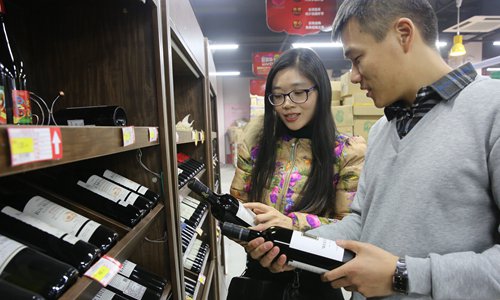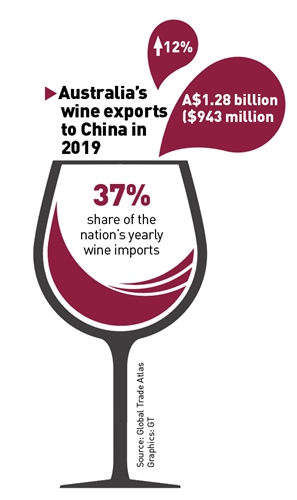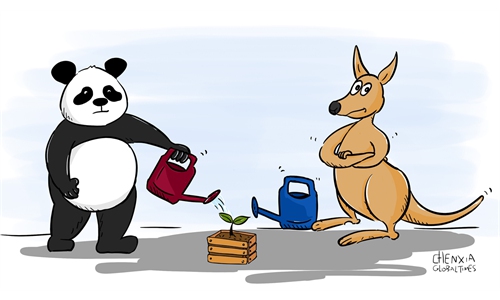SOURCE / INDUSTRIES
China starts second probe of Australian wine
Canberra siding with the US leads it into a trap: observer

Consumers choose Australian wine at a shopping center in Qingdao Free Trade Port, East China's Shandong Province. Photo: IC
China launched an anti-subsidy probe into Australian wines on Monday, less than half a month after it started an anti-dumping probe against the same product, signaling a continued cooling in economic relations amid the Morrison administration's escalating hostility toward China.
The Ministry of Commerce announced on Monday that it was launching an anti-subsidy probe into Australian wines sold in containers holding two liters or less. The investigation is expected to be completed by August 31, 2021 under normal circumstances, but it could be prolonged until February 28, 2022, the ministry statement said.
China launched anti-dumping probe against Australian wine on August 18.
"China launched probes as it found problems with Australian wines being exported to China," Li Guoxiang, a research fellow in the agricultural sector at the Chinese Academy of Social Sciences, told the Global Times on Monday.
"Based on my study of the Australian agricultural sector in 2013-14, it is difficult for the cost of Australian wine to be lower than Chinese domestic wine, so Canberra is likely providing subsidies to its farmers. That's one of the reasons China launched the anti-subsidy probe," Li said, noting that conducting anti-dumping and anti-subsidy investigations simultaneously is a standard trade investigation process under WTO rules.
As an economy that heavily relies on trade with China, Australia saw its wine exports to China surge since 2019, when a free trade agreement took effect, which allowed Australian wines to be imported into China without tariffs.
In 2019, Australia's wine exports to China rose 12 percent year-on-year to A$1.28 billion ($943 million), becoming China's biggest wine provider with a 37 percent share of the nation's yearly wine imports.

xxxx
However, Australia's wine exports may be heavily affected if the investigations find problems, according to analysts.
"The Morrison administration itself should be blamed if Australia's exports to China fall, because the administration should have known that its unreasonable actions would bring adverse effects to China-Australia economic relations," Zhao Gancheng, director of the Center for Asia-Pacific Studies at the Shanghai Institute for International Studies, told the Global Times on Monday.
"China has done nothing bad to Australia, whereas Australia - in its move to side with the US - keeps unreasonably accusing and attacking China," Zhao said, noting that doing so severely damages bilateral political trust.
The Morrison administration, following the policies of the US Trump admin-istration, was the first Western country to shun Huawei's 5G equipment, while calling for an independent investigation into China's epidemic situation and suggesting that COVID-19 was from China.
"Many of Australia's China hawks - who are aware of the complementary na-ture of China and Australia trade - are playing a game of politically provoking China while attempting to gain huge economic benefits from dealings with China," Ruan Zongze, executive vice president of the China Institute of Inter-national Studies, told the Global Times on Monday.
Ruan said that Australia's pro-US foreign policy that aims to strengthen diplo-matic relations with Washington has led Australia into a "trap", leading many to think that US-leaning Australia can't make decisions on its own. "This complies with neither Australia's interests nor international principles," he said.
Products that China imports from Australia can be bought from other coun-tries, Zhao said, noting that if the Australian government doesn't care about its economic interests, China can certainly import from other sources.
Amid souring bilateral ties, China's imports of goods from Australia dropped 4.4 percent year-on-year in the first seven months of 2020 to $66.92 billion, data from the Chinese General Administration of Customs showed.

